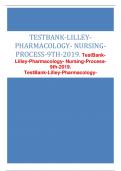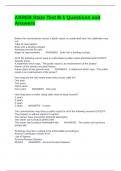CHAPTER 8: SOCIAL INFLUENCES AND PERSUSION:
-Fake news is a form of news containing deliberate misinformation or
lies that is spread through traditional channels.
-Fake news stories are not always spread by people. Sometimes they
are spread by robots
-One consequence of misinformation is that it causes people to stop
believing in facts and it also creates a sense of uncertainty about
whether facts are knowable at all.
-Misinformation is very difficult to correct once it has spread.
Third-person effect:
-Occurs when people believe that fake news has a stronger effect on
other people than on themselves.
-As social animals, people are responsive to each other.
- As cultural animals, people rely on each other for information about
the world and for guidance about how to act in uncertain situations.
-This dependency on others creates opportunities for social
influence.
Two categories of social influence:
Normative
Informational influence
1. Normative influence:
-Involves going along with the crowd to be liked and accepted.
-Being accepted and included improves one’s chances for survival.
-To live together, people need to agree on a set of common beliefs,
values, attitudes, and behaviors that reduce ingroup threats and act
for the common good.
,-People learn to conform to their group’s rules.
-The more we see others behaving in a certain way or making
decisions, the more we feel inclined to follow suit.
- It may bring about mere public compliance.
Public compliance:
-Outwardly going along with the group but maintaining a private,
inner belief that the group is wrong, or at least having serious doubts
about the group’s decision.
Example: Some people become vegan because they believe it is a
healthier lifestyle and better for the planet (private acceptance),
whereas others might become vegan because all their friends think
it is trendy and cool, even though inwardly they love to eat meat
(public compliance).
The power of normative influence:
-Study by a Polish gestalt psychologist turned social psychologist
Solomon Asch in 1951.
-He found that conformity increases as group size increases up to a
point, then it levels off.
-In his study, there was a ‘dissenter’ who always gave the correct
answer.
Conclusions about the dissenter:
-People feel considerable pressure to conform to a group if everyone
agrees, but if group members disagree about even the smallest
point, then people become willing to stand up for what they believe.
-When people deviate from group norms, they may pay a heavy
price, including social rejection.
-Rejection is more likely when there are only one or two non-
conformists than when there are many non-conformists.
, 2. Informational influence:
-Involves going along with the crowd because you think the crowd
knows more than you do.
-People get valuable information from others and rely more on what
others.
Two types of situations increase how likely you are to be affected
by informational influence:
(a)Ambiguous situations, in which people do not know how to
behave
(b)Crisis situations, in which people don’t have time to think for
themselves.
-In these situations, people conform to what others do because they
assume that those other people must know what they are doing.
-Sometimes this assumption is wrong as others really do not know
more than we do.
State of pluralistic ignorance:
-Looking to others for cues about how to behave, while they are
looking to you, collective misinterpretation.
-Nobody knows anything.
-It occurs when people attempt to match a group norm.
-Pluralistic ignorance in the classroom can interfere with learning.
Example: Have you ever sat through a class feeling completely lost
and confused about the material being presented? You want to ask
a question, but you’re too embarrassed to ask it. No one else is
saying anything, so you assume everybody else understands the
material. In fact, the other students are probably just as confused
as you are.
-Fake news is a form of news containing deliberate misinformation or
lies that is spread through traditional channels.
-Fake news stories are not always spread by people. Sometimes they
are spread by robots
-One consequence of misinformation is that it causes people to stop
believing in facts and it also creates a sense of uncertainty about
whether facts are knowable at all.
-Misinformation is very difficult to correct once it has spread.
Third-person effect:
-Occurs when people believe that fake news has a stronger effect on
other people than on themselves.
-As social animals, people are responsive to each other.
- As cultural animals, people rely on each other for information about
the world and for guidance about how to act in uncertain situations.
-This dependency on others creates opportunities for social
influence.
Two categories of social influence:
Normative
Informational influence
1. Normative influence:
-Involves going along with the crowd to be liked and accepted.
-Being accepted and included improves one’s chances for survival.
-To live together, people need to agree on a set of common beliefs,
values, attitudes, and behaviors that reduce ingroup threats and act
for the common good.
,-People learn to conform to their group’s rules.
-The more we see others behaving in a certain way or making
decisions, the more we feel inclined to follow suit.
- It may bring about mere public compliance.
Public compliance:
-Outwardly going along with the group but maintaining a private,
inner belief that the group is wrong, or at least having serious doubts
about the group’s decision.
Example: Some people become vegan because they believe it is a
healthier lifestyle and better for the planet (private acceptance),
whereas others might become vegan because all their friends think
it is trendy and cool, even though inwardly they love to eat meat
(public compliance).
The power of normative influence:
-Study by a Polish gestalt psychologist turned social psychologist
Solomon Asch in 1951.
-He found that conformity increases as group size increases up to a
point, then it levels off.
-In his study, there was a ‘dissenter’ who always gave the correct
answer.
Conclusions about the dissenter:
-People feel considerable pressure to conform to a group if everyone
agrees, but if group members disagree about even the smallest
point, then people become willing to stand up for what they believe.
-When people deviate from group norms, they may pay a heavy
price, including social rejection.
-Rejection is more likely when there are only one or two non-
conformists than when there are many non-conformists.
, 2. Informational influence:
-Involves going along with the crowd because you think the crowd
knows more than you do.
-People get valuable information from others and rely more on what
others.
Two types of situations increase how likely you are to be affected
by informational influence:
(a)Ambiguous situations, in which people do not know how to
behave
(b)Crisis situations, in which people don’t have time to think for
themselves.
-In these situations, people conform to what others do because they
assume that those other people must know what they are doing.
-Sometimes this assumption is wrong as others really do not know
more than we do.
State of pluralistic ignorance:
-Looking to others for cues about how to behave, while they are
looking to you, collective misinterpretation.
-Nobody knows anything.
-It occurs when people attempt to match a group norm.
-Pluralistic ignorance in the classroom can interfere with learning.
Example: Have you ever sat through a class feeling completely lost
and confused about the material being presented? You want to ask
a question, but you’re too embarrassed to ask it. No one else is
saying anything, so you assume everybody else understands the
material. In fact, the other students are probably just as confused
as you are.




